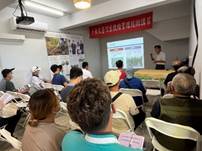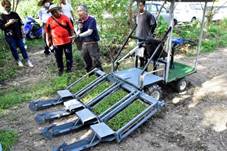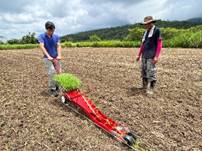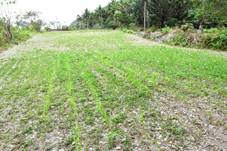To support and promote agricultural development and provide guidance for technical advancement in Indigenous communities, the Taitung District Agricultural Research and Extension Station (TTDARES) of the Ministry of Agriculture held the Indigenous Agricultural Industry Mobile Classroom on August 4, 9, and 11 in Chishang and Jinfeng. Promoting the mechanization of millet transplanting is aimed at lowering the costs of field management and reducing the need for labor.
Millet is an extremely important staple among Indigenous communities and holds great cultural value. The East Rift Valley and the region along the South Link Highway in Taitung are major sites of production. As young Indigenous people are leaving their hometowns and as the population ages, the industry has long faced an insufficiency of labor, causing millet-farming hectarage to fall over time. But in recent years, demand for the crop has grown, so to effectively boost agricultural development in Taitung’s Indigenous communities, the TTDARES has promoted a series of machinery for cultivation management and postharvest processing. With labor-saving, high-performance machinery, Indigenous communities are being helped to overcome the problem of the labor shortage, in turn boosting people’s willingness to grow millet. In comparison with traditional line sowing and broadcast sowing, the seedling and transplanting technology developed this year by the TTDARES reduces the quantity of seed needed by 40-70% and enhances the seedling survival rate. In addition, weeding costs are reduced in the early growth stage, and there is less need for thinning, which makes it easier for a grower to handle the workload alone. People can choose from different types of machinery based on the size of their fields, topography, and labor supply. During educational events held in Indigenous communities, the TTDARES offers guidance on field and industry management while providing innovative technology and information to increase people’s farming know-how and thus inject new life into agricultural development in the communities.
Millet is an extremely important staple among Indigenous communities and holds great cultural value. The East Rift Valley and the region along the South Link Highway in Taitung are major sites of production. As young Indigenous people are leaving their hometowns and as the population ages, the industry has long faced an insufficiency of labor, causing millet-farming hectarage to fall over time. But in recent years, demand for the crop has grown, so to effectively boost agricultural development in Taitung’s Indigenous communities, the TTDARES has promoted a series of machinery for cultivation management and postharvest processing. With labor-saving, high-performance machinery, Indigenous communities are being helped to overcome the problem of the labor shortage, in turn boosting people’s willingness to grow millet. In comparison with traditional line sowing and broadcast sowing, the seedling and transplanting technology developed this year by the TTDARES reduces the quantity of seed needed by 40-70% and enhances the seedling survival rate. In addition, weeding costs are reduced in the early growth stage, and there is less need for thinning, which makes it easier for a grower to handle the workload alone. People can choose from different types of machinery based on the size of their fields, topography, and labor supply. During educational events held in Indigenous communities, the TTDARES offers guidance on field and industry management while providing innovative technology and information to increase people’s farming know-how and thus inject new life into agricultural development in the communities.










